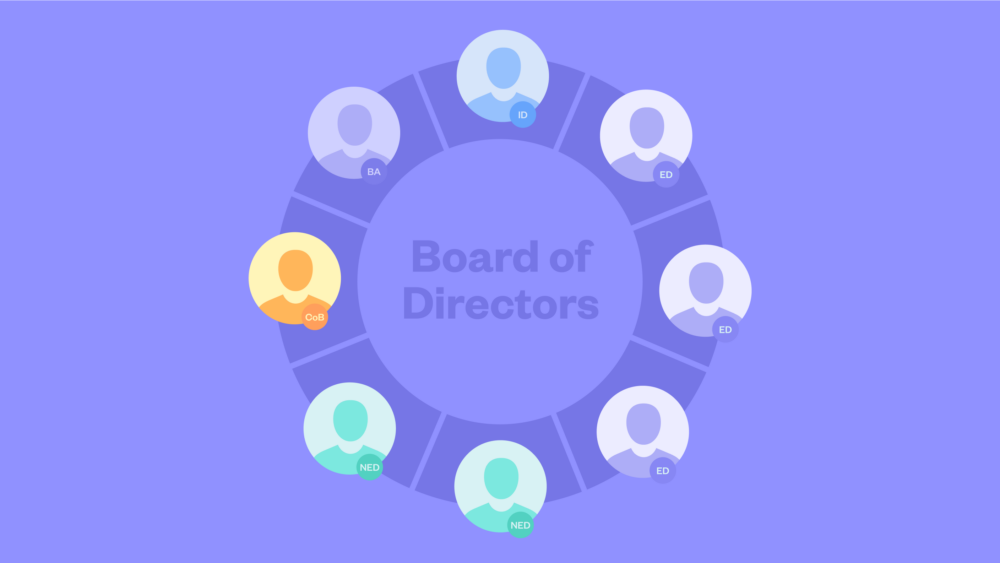Optimising your LinkedIn profile with Ekky Manoilenko and Rob Cossins
Learn how to optimise your LinkedIn profile to turn impressions into funding with Ekky Manoilenko and Rob Cossins from S...
In the early stages of a startup, the founder is usually the CEO and owns most of the business. This means that the need for a board is not a priority. However, as a startup grows, investors might start to ask for a Director’s position and ask for more structured governance. At this point, you might find it useful to appoint an NED or Board Advisor, in order to have impartial advisors to balance out the investor’s interests.
A Chairman who oversees the actions of the board, or a Board Observer who participates in meetings, are other options which are available to you. Having a strong board with expert advisors is highly valuable to the founder as they can help with a range of issues which are relevant to the company.
If you are bringing on new directors and advisors, you can create all the legal contracts you need to make it official for free on SeedLegals, including a Founders Service Agreement, Advisor Agreement, Appointment of Director Form, Appointment of Director (NED) and Consultancy Agreement, among others.
Below is a list of the various board roles which exist and their respective responsibilities:
Executive Directors are agents of the company, appointed by the shareholders to manage its day-to-day affairs. They are often also the founders, and have the power to influence the strategy and decision-making of a business. However, Executive Directors are not free to act alone. They are personally liable for any malpractice of the company and must abide by the following seven duties under the Companies Act 2006:
NEDs are formally appointed at Companies House. They are impartial and have no interest or involvement in the company. This means that they cannot be managers, investors or employees in the company. As a result, they have the ability to look at any issues facing the founding team from a fresh perspective, prioritise which to tackle first, and make any decisions in the interest of the business rather than for personal gain.
NEDs are usually very experienced professionals who have a wealth of experience in the industry, gained over a number of decades. They are valuable to the board because they often have useful contacts and connections that can help founders develop their business.
Finally, NEDs can bring credibility to your company, since having a well-respected business leader on the board brings comfort to investors and increases the value of your company in the eyes of stakeholders.
Similarly to Executive Directors, NEDs must act according to the Directors’ Duties.
Investor Directors are investors which are formally appointed at Companies House and sit on the board as Directors. They are also subject to the same duties under the Companies Act 2006 as Executive and Non Executive Directors.
Investors are mainly keen to get a board position in order to protect their own investment. Therefore, if the board only consists of a Founder and Investor Director, this can be a dangerous situation as the investor will make decisions which are in their own interests instead of in the interests of the company. To counterbalance this possibility, appointing an NED can provide your board with an impartial decision-maker who can help keep the Investor Director in check.
Another issue you might encounter if you have an Investor Director could be that they might try to negotiate high fees and unreasonable refunds on expenses. This can be an issue if they do not contribute very much in the actual board meetings.
Nevertheless, paying the Investor Director a fee is common practice, especially if the investor does not receive much of a salary. The solution would be to pay an hourly fee (e.g. £250/hour) for board meetings that Investor Directors do attend, and to try to have more video meetings.
The Chairman’s primary role is to ensure that the board is effective in its task of implementing the company’s direction and strategy. The board appoints the Chairman, who may work full-time or part-time, and is subject to the same duties under the Companies Act 2006 as Directors. The Chairman’s principle functions are to:
An Advisor can sit on the board as a Board Advisor. If they are not also a Director, they are not subject to the Directors’ Duties. Unlike a Consultant, an Advisor does not need to deliver a tangible product or solution; they are just there to share expert advice. They can be employed at an hourly rate to share their knowledge and perspective on different issues.
A Board Observer might be a minority stakeholder in the company, or an Investor who is looking to avoid the liabilities and risks of being a Director. Observers are allowed to participate in board meetings and to receive all information provided to members of the board, but are not allowed to vote on any issues brought by the board. A Board Observer is not a Director and therefore cannot be subject to the Directors’ Duties.







